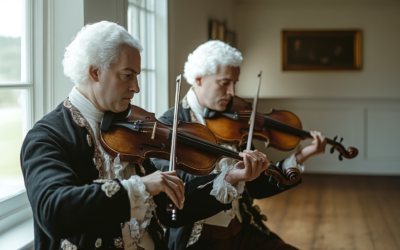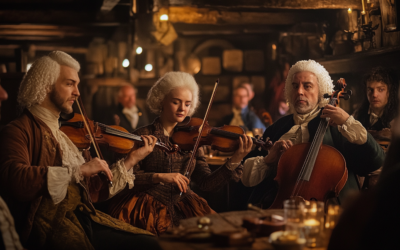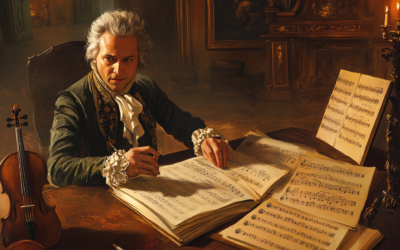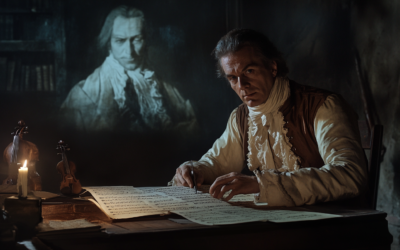Unmasking the Myth
The Cibavit eos and Mozart's Deceptive Legacy
In the realm of classical music, Wolfgang Amadeus Mozart is often portrayed as an unparalleled genius. However, a closer examination of his early works reveals a very different narrative, one in which mastery may be more illusion than reality. A striking example is the motet Cibavit eos in adipe (K. 44), which has been erroneously and romantically attributed to Mozart in various biographies.
Mozart: The Fall of the Gods
This book offers a fresh and critical look at the life of Wolfgang Amadeus Mozart, challenging the myths that have surrounded him for centuries. We strip away the romanticised image of the “natural genius” and delve into the contradictions within Mozart’s extensive biographies. Backed by nearly 2,000 meticulously sourced citations, this work invites readers to explore a deeper, more complex understanding of Mozart. Perfect for those who wish to question the traditional narrative, this biography is a must-read for serious music lovers and historians.
"They have painted a misleading portrait of a composer, as if he were profoundly skilled in counterpoint and polyphony at just fourteen years old, which is absolutely untrue."
Mozart: The Fall of the Gods
At the tender age of fourteen, Mozart faced a composition exam at the prestigious Accademia Filarmonica in Bologna—a moment that should have marked a significant turning point in his career. The exam, however, was a disaster, but he was passed nonetheless, as if the whole charade was designed to bolster a burgeoning myth.
Musicologist Hermann Abert suggested that Mozart had prepared for this farcical examination under the guidance of Giovanni Battista Martini. The reality, however, appears far less impressive. Abert claimed that Mozart had composed Cibavit eos, a supposed masterpiece that demonstrated his ability to compose in the ancient style.
The Illusion of Originality
Abert and other scholars, blinded by their own biases, asserted that Mozart approached the exam with serious preparation, producing the Cibavit, which, according to these scholars, showcased his emerging talent, impressing none other than Father Martini himself. However, a more rigorous investigation reveals that Cibavit was not an original work but a mere copy, beautifully transcribed. It unmistakably echoes the style of late Renaissance composers, a fact that becomes glaringly obvious even to the casual listener.
A Shattered Illusion
Recent discoveries have unveiled that K. 44 is a copy of an earlier work by Johann Stadlmayr rather than an original composition by Mozart. This revelation serves as a powerful testament to the precarious nature of the alleged genius of Mozart. The admiration he has received is built on a foundation of misconceptions and inaccuracies, such as the case of Cibavit, perpetuated by an uncritical acceptance of earlier biographical accounts.
The Mozart establishment and its so-called experts have confused early Renaissance music with Mozart’s compositions, revealing their ignorance of both. They have painted a misleading portrait of a composer who, at the age of fourteen, supposedly mastered counterpoint and polyphony. In reality, this is far from the truth.
Conclusion
The narrative surrounding Cibavit eos challenges us to rethink the stories we have been told and to question the foundations of the mythic genius that surrounds Mozart. This motet does not demonstrate the brilliance of Wolfgang Amadeus Mozart; instead, it exposes the superficiality of Mozart studies, highlighting how easily myths can be constructed and perpetuated in the world of classical music.
You May Also Like
The Mysterious Case of Mozart’s Duets: An Unfinished Story
Mozart’s string duets have long been shrouded in mystery, from his father’s heavy influence in 1768 to his supposed act of charity for a dying Michael Haydn in 1783. These unfinished works reveal more about the composer’s life and struggles than they do about his musical genius.
The Misattribution of Mozart’s K.2 89a (K.6 73i): A Questionable Canon
K.2 89a (K.6 73i), attributed to Mozart, is riddled with issues—missing voices, incomplete harmonies, and even the absence of text. Should this piece really be in his catalogue?
The Borrowed Simplicity: Mozart’s Canons K.555, K.557, and K.562
The canons K.555, K.557, and K.562, often overlooked for their simplicity, reveal striking similarities with the works of Antonio Caldara. These three pieces, dated 1788, demonstrate how Mozart adapted and simplified Caldara’s contrapuntal structures, masking his influences while reflecting the galant style of the era.
Mozart’s Quartet of Lodi: A Dated Work with Many Influences
Mozart’s Quartet of Lodi is often praised as an early masterpiece. But was it really his own work?
Mozart’s Violin Pieces: Substitutes for Failed Movements?
Despite revisions, Mozart’s violin concertos remain flawed, while his minor pieces, K.261 and K.373, surprisingly garner more attention in his correspondence than his major works.
The Questionable Origins of Mozart’s Violin Concertos
Are Mozart’s violin concertos truly original? This article explores the possibility that the Czech composer Josef Mysliveček played a far larger role in their creation than previously acknowledged.







